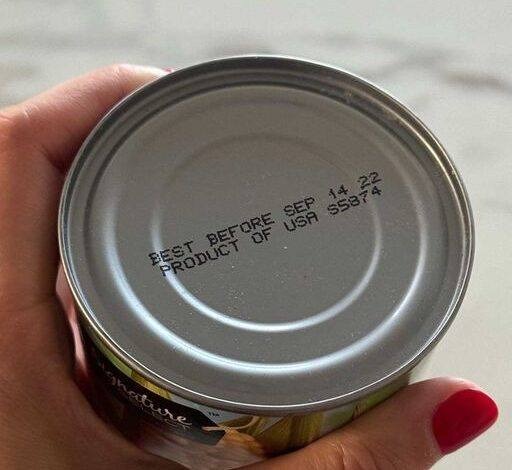What Do ‘Best By’ and ‘Best Before’ Dates Really Mean?
The “Best By” or “Best Before” date on canned goods refers to the date when the product is expected to be at its peak quality, not its expiration. It indicates when the manufacturer believes the food will taste best or retain its optimal texture. These dates are not safety-related; they are about quality. Many people mistakenly treat these dates as expiration dates, leading them to dispose of perfectly good food. However, most canned foods are still safe to consume long after this date, provided they are stored correctly.
Canned Corn and Green Beans: Lasting Beyond the Label
Canned vegetables like corn and green beans are commonly stocked in kitchens for convenience. These foods can last 1-2 years beyond the “Best By” date when stored in a cool, dry place, away from heat and sunlight. Over time, the flavor and texture may gradually decline, but they will still be safe to eat if the can remains intact. The key is to pay attention to the storage conditions, as temperature fluctuations or moisture can cause the food to spoil sooner.
However, if you notice any significant changes in the texture or taste, such as mushiness or an off flavor, it’s best to discard the can. These changes are natural over time but should not pose a major health risk if the can is undamaged.
Canned Tuna: A Long Shelf Life with Careful Storage
Canned tuna is a pantry staple known for its versatility in salads, sandwiches, and casseroles. If stored properly, canned tuna can remain safe for 3-5 years beyond the “Best By” date. However, as with other canned foods, the quality will begin to degrade with time. You might notice a change in taste or texture, but the tuna itself should still be fine to eat.
It’s important to inspect the can for any signs of damage before consuming. If the can is swollen, rusted, or leaking, it’s best to dispose of it. Even if the tuna appears to be in good condition, always trust your senses. If the smell, appearance, or taste seems off, it’s safer to throw it away.
Key Safety Tips: How to Ensure Your Canned Foods Are Safe
While most canned goods have a long shelf life, it’s essential to check the condition of the can before consuming the food inside. Here are some important safety tips to keep in mind:
- Inspect the Can: Always check the can for signs of damage, including bulging, rust, or leaks. Bulging cans are a major red flag as they indicate the presence of gas buildup, often from bacterial growth.
- Smell and Appearance: If the contents of the can smell strange or have an unusual color or texture when opened, discard them immediately. A foul odor or off appearance may indicate spoilage, even if the food is technically past its “Best By” date.
- Store Properly: To ensure your canned goods stay fresh for as long as possible, store them in a cool, dry, and dark place. Avoid areas that experience temperature fluctuations, such as near stoves or windows. Store cans upright to avoid the risk of leaks.
- Rotate Your Stock: Use a first-in, first-out (FIFO) rotation system to ensure that older items are used before newer ones. This helps you avoid keeping cans beyond their prime quality.
- Unused Portions: If you’ve opened a can and have leftovers, transfer them to a sealed container and refrigerate them promptly. Opened canned goods should not be kept in the can itself, as the metal can react with the food and affect the taste.
Maximizing Shelf Life: A Few Extra Tips
Canned foods are a great option for long-term storage, but it’s important to maximize their shelf life by following proper storage practices. Storing them in the right environment and rotating your stock can help you get the most out of your canned goods. Even if a can is a few months past its “Best By” date, it might still be fine to consume as long as there are no signs of spoilage.
Conclusion: Don’t Waste, Make the Most of Your Canned Goods
Understanding the real meaning behind “Best By” or “Best Before” dates can prevent unnecessary food waste and help you get the most out of your pantry. Canned vegetables, tuna, and other items can last well beyond the listed dates as long as they are stored correctly and the cans are in good condition. By taking the time to check for damage and following proper storage methods, you can safely enjoy canned goods even after their suggested peak quality period.
